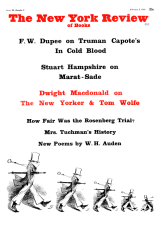In response to:
"The Formidable Dr. Robinson": A Reply from the January 20, 1966 issue
To the Editors:
At the very opening of my review of Mr. Robinson’s book, I wrote that the Arendt debate provoked both violent denunciation and emphatic assent, that it generated more heat than light; precisely because passions run so strongly, historical truth has suffered. I am sorry to see from Miss Arendt’s reply that my attempt to reduce the temperature has not been very successful. I do not think detailed comment on Miss Arendt’s very long letter is called for: some of the issues she raises cannot possibly be of public interest. Surely Miss Arendt is the only reader of my review who gained the impression that I am the “admiring Mr. Laqueur.” Much of the letter concerns Mr. Robinson’s book, not what I wrote about it, and I am glad my review provided an opportunity for Miss Arendt to make her comments. But I see little point in perpetuating an increasingly acrimonious polemic, based on unedifying personal denunciations, semantic hair-splitting, and the wish to score points and to denigrate rather than to understand the opposing point of view. This is not a level on which truths can be established and insight gained. The basic points I tried to make in my review (and which apparently need restating) are very briefly these: Miss Arendt touched on some disturbing aspects of the holocaust which ought not to be glossed over but should be studied in detail. But her book is deficient in both factual knowledge and judgment.
As for Mr. Robinson, I made it fairly clear that with all his knowledge of matters of detail he did not come to grips with the basic issues, and that for this reason his book is disappointing. The suggestion that I am in some way an employee of Dr. Robinson, implied in Miss Arendt’s letter, is ridiculous; I fear, however, that whatever I say will not convince her because she knows that all this is part of a conspiracy.
Miss Arendt is convinced that it was her cardinal sin in the eyes of the Jewish establishment to “tell the truth in an hostile environment,” but that the attacks against her, by some Hegelian cunning of reason, achieved exactly the opposite effect from that intended. They provoked a discussion of Jewish conduct in the face of the catastrophe, an issue “which may plague Jews for generations to come.” I see the effect of Miss Arendt’s book in a different light. It was not meant to display the fruits of original research; as far as recent Jewish history is concerned it said nothing that had not been said before. Miss Arendt was attacked not so much for what she said, but for how she said it. Her attackers, on the other hand, were all too often inclined to throw out the baby with the bathwater. Incensed by offensive remarks or misconstructions in Miss Arendt’s book, they brushed aside the discussion of the real issue she had raised, and this became so highly charged that a rational discussion of this complex of questions has been much more difficult during the last few years. In Miss Arendt’s eyes, all this of course is the fault of her critics.
There is no deliberate conspiracy, I believe, on the part of the “Jewish establishment” to hide the truth. There has been and is great reluctance to pass judgment on certain Jewish leaders. They may have failed, they may have to be condemned; and yet, who does not feel that there but for the grace of God, go I? The real sins of omission committed by what Miss Arendt calls “the officers of interest groups” she does not mention; perhaps she is not aware of them. Some of them tried to monopolize the historiography of the catastrophe in their own hands; they did valuable work in collecting source material but discouraged all “outsiders” and all the more ambitious projects to write the history of the period in one of the world’s main languages; they failed to enlist younger historians and make them partners in their work. (Mr. Robinson’s book was apparently meant to be the final word on the subject—at least for the time being.) This was a mistaken policy and it has resulted in a serious crisis; the whole future of this official historiography is now in the balance. Common human failings underlie this crisis; its causes are less dramatic and sinister than Miss Arendt believes. I think I can assure her that the Elders of Zion are not yet out to get her.
Walter Laqueur
This Issue
February 3, 1966



